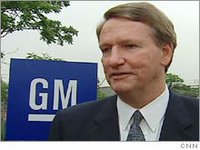

General Motors has been in the news lately:
"General Motors has announced that it will cut 30,000 jobs by 2008 and stop production at nine assembly, powertrain and stamping plants."
"Now, its workers are coming to grips with the idea that they may lose their jobs, and questions remain about how much the cuts will help the struggling automaker going forward."(Christian Science Monitor)
"GM CEO Rick Wagoner detailed the company's job-cut plans but declined to say when the troubled automaker might return to profitability." (CNN)
True, but what has this to do with Universal Health Coverage for Americans? You know the system found in various varieties in 10 or 11 modern industrialized countries. In fact, the system that our Canadian cousins are fortunate to have. Canada spends about 10% of its GNP on health insurance for ALL Canadians. The U.S. spends about 15% of our GNP and 45,000,000 Americans are either un-insured or drastically under-insured.
This situation made me think of a major article that appeared in the Health Letter of The Public Citizen Health Research Group, December 2004. (Any quotes in this blog from this point on are from this report.}
"Publically financed but privately run health care for all --- including free choice of physicians --- would cost employers far less in taxes than their costs for insurance ." In addition ..."employers would no longer have to pay for medical care under workers' compensation, which in 2002 costs them more than $38 Billion."
The National Coalition on Health Care believes that the U.S. approach to health care "slows the rate of job growth, suppresses wage increases for current workers, undercuts the viability of pension funds, and puts American firms at a steep disadvantage in world markets."
Two reasons occur to me that help explain why health care costs are so high in the United States. First, the huge number of private insurance companies form a bureacracy that devours 35 cents of every health care dollar spent here. Second, our government's refusal --- as seen in the last prescription drug plan (that unfortunately passed congress) --- to negotiate drug prices with pharmaceutical companies, and, if necessary to "cap" costs.
A single payer plan would eliminate much of the 35% that at present goes to paper shuffling in the private insurance bureaocracy. Medicare's administrative costs are 1-2 cents per dollar. So, much for government waste!
Another fable: the pharmaceutical industry is making tremendous profits in America today. They claim they need these profits to fuel research into new medicines. Has anyone been able to find out what percent of their enormous profits actually goes into research? I have not been able to find these figures.
Personally, I would like to see some of these profits go into providing good health coverage for EVERY American--even if it means that there might be a slight delay in developing new prescription drugs, e.g. viagra. And, I am not sure that would happen.
It seems to me that Americans are being asked to choose between food, shelter and/or heat and the medicines they need so that ---according to Pfizer, etc.--they have the money to develop new products for all the world.
The article also points out that statistics indicate that some employers are reducing new hires because of the cost of their private health policies for their workers. As of December 2004 health insurance ..."now costs the nation's employers an average of $3,000 a year for each workers...."
Not too long ago one of the longest strikes in recent history took place in southern California against supermarket chains. "It left about 60,000 union workers jobless, and it seriously hurt the owners as well." This strike over health insurance would not have taken place had there been universal health coverage.
Since universal health insurance in the States would actually benefit not just workers but the corporations, why do these large companies oppose it so adamantly?
:...Raymond Werntz, who for nearly thirty years ran healthcare programs for the Whitman Corporation, a Chicago-based multinational holding company... said "Business leaders worship market place ideology 'almost like religion'." Werntz indicated that their opposition was usually emotional --- not rational. They believe universal health insurance suggests "socialism" and is some kind of "heresy".
Yet, these same corporations usually have no problem with Medicare, seeming to believe it's a fine thing.
Moving to universal health care with a single payer would reduce health care costs enough to pay for universal coverage without any increase in expenditure --- and it would take a large burden off corporations. Naturally, two groups of corporate entities would oppose it: the pharmaceuticals and the health insurance corporations. And the vast majority of corporate leaders stick together ---the old boy network writ large.
In 2002 a study was done that showed if the U.S. switched to the Canadian model would have saved $286 Billion.
In the first part of 2004 a study appeared in the Journal of Health Services that reached this conclusion: "The United States wastes more on health-care bureaucracy than it would cost to provide health care to all the uninsured."
"Canada has had a single-payer system for more than thirty years. (Australia, Denmark, Finland, Iceland, Sweden and Taiwan also have one.)"
American executives who have run Canadian subsidiaries of their firm have remarked that Canada's system is a "business boon".
Charles Baillie former chairman and CEO of Toronto Dominion Bank, one of Canada's six largest has said that the Canadian health system is "an economic asset, not a burden". He also said that "In an era of globalization, we need every competitive and comparative advantage we have. And the fundamentals of our health care system are one of those advantages."
General Motors just a few days ago announced large employee layoffs and a number of significant plant closings. One reason they gave was the rising costs of health insurance, and they pressured the unions to have the workers pay more. Of course, as economists have pointed out General Motors has not produced cars that can compete in the open market with overseas companies like Toyota because GM cars -- in general -- are not giving their customers what they want and what they need. One of those things are cars that are carefully built, get better gas mileage, and need few trips to the repair shop. Within probably one to two years Toyota will replace GM as the company with the world largest share of auto/truck production.
"In 2001 GM was reeling from a prescription-drug bill up to 22 percent above 2000's $1.1 Billion."
"...Canada uses single-payer price controls to cap drug prices. In two other universal-coverage countries, Australia and New Zealand, pharmacies charge 20 to 30 percent less than in Canada."
Ford and General Motors have consistently opposed universal coverage. DaimlerChrysler regularly endorses it. An executive from the latter company said that the defeat of the Clinton administration's universal coverage proposal was due to business interests who "effectively killed the bill".
Yet, universal heathcare insurance would be beneficial to business---both large and small---except for two main groups: the pharmaceutical cartel and the insurance bloc.
These last two lead the charge and most of the other business entities follow their lead. Why? They are true believers in a false ideology about health care. And---because they do not want to be seen as jumping the ship that containing the other business groups and corporations.
Corporations subject to government regulations do not want to irritate those in control of the U.S.A. For these business leaders to indicate any support for a universal health care system would encur the wrath of the Bush White House, one of the most ideologically oriented administrations in U.S. history.
" 'I don't believe (single payer) will be achievalabe in my lifetime,' says Ron Pollack, executive director of Families USA. Ideologues 'will never support it.' Industries heavily invested in the present system 'will spend every last dollar to stop it.' "
And how will their ill-spent dollars stop such a single payer, universal coverage program?
By misinforming the American public, by distorting the reality of what is good for American through propaganda, aka, massive advertising--always in our faces.
Millions will be spent to encourage our elected representatives to vote against a system which benefits us. Those who support the vested interests will make sure their friends are re-elected---not ours.
Deborah Richter, a Vermont physician believes it (universal health insurance) could be enacted state by state. This type of insurance can gain support, she says, when Americans began to see it " as a public good, as are roads, education and police and fire protection".
"Corporate Amerca is blowing a supreme opportunity to do well by doing good. Enlightened self-interest -- this is not"
In June of 2004 Richard Wagoner Jr., GM president and CEO he said that the United States ranks twelfth among thirteen industrialized countires judged by sixteen top health indicators.

